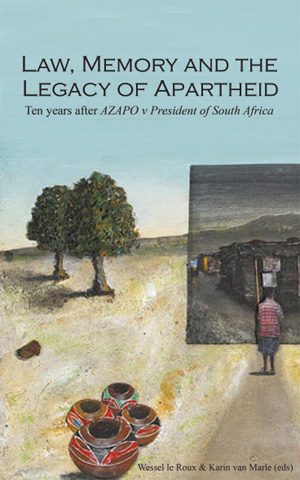Law, memory and the legacy of apartheid: Ten years after AZAPO v President of South Africa
by Wessel le Roux and Karin van Marle
2007
ISBN: 978-0-9802658-3-5
Pages: 203
Print version: Available
Electronic version: Free PDF available
About the publication
Many constitutional commentators have pointed to the central role that an engagement with the apartheid past plays in the two post-apartheid Constitutions. The AZAPO judgment in which the constitutionality of the amnesty provisions of The Promotion of National Unity and Reconciliation Act 34 of 1995 was challenged is central to a sustained engagement with post-apartheid law and the legacy of the past. A seminar took place on 18 August 2006 at the University of South Africa to provide a retrospective on the AZAPO judgment, ten years after it was handed down. A number of the essays in this collection were originally presented as papers at the seminar.
Part 1 ('Memory and legal interpretation') focuses explicitly on the ability of law to institute and sustain a different politics of memory: How is law related to the process of memory making? How does law remember (if at all)? How does law's memory relate to the wider process of aesthetic memorialisation in society? In Part 2 ('Repairing the past, restoring the future') the focus of the essays shifts from jurisprudential reflections on the politics of memory to more direct engagements with issues of reparation and restoration in the wake of past injustices: How is law related to the process of reparation? How does law's justice relate to the wider process of restoration in society?
The inability to achieve constitutional closure, which is so dramatically illustrated by the AZAPO judgment, equally applies also to all other post-apartheid constitutional judgments. Re-reading AZAPO therefore becomes constantly re-reading and marking the limits of all law.
About the editor:
Wessel le Roux is Professor in Public Law at the University of the Western Cape.
Karin van Marle is Professor at the Department of Legal History, Comparitive Law and Jurisprudence, at the Faculty of Law, University of Pretoria.
Table of Contents
Acknowledgments
The unmentioned names that remain (an introduction)
Wessel le Roux and Karin van Marle
PART 1: MEMORY AND LEGAL INTERPRETATION
- 1. Thoughts on dealing with the legacies of radically unjust political behaviour
Johan Snyman - 2. Law’s time, particularity and slowness
Karin van Marle - 3. Transforming memory transforming
Michael Bishop - 4. AZAPO: monument, memorial ... or mistake?
Lourens du Plessis - 5. War memorials, the architecture of the Constitutional Court building and countermonumental constitutionalism
Wessel le Roux
PART 2: REPAIRING THE PAST, RESTORING THE FUTURE
- 6. Reading and writing archives: The TRC, big business and reparations in post-apartheid South Africa
Jaco Barnard - 7. Good victim, bad victim: Apartheid’s beneficiaries, victims and the struggle for social justice
Tshepo Madlingozi - 8. Ten years of democracy in South Africa: Revisiting AZAPO decision
Nthabiseng Mogale - 9. In defence of AZAPO and restorative justice
Patrick Lenta
Contributors
Bibliography
Index
